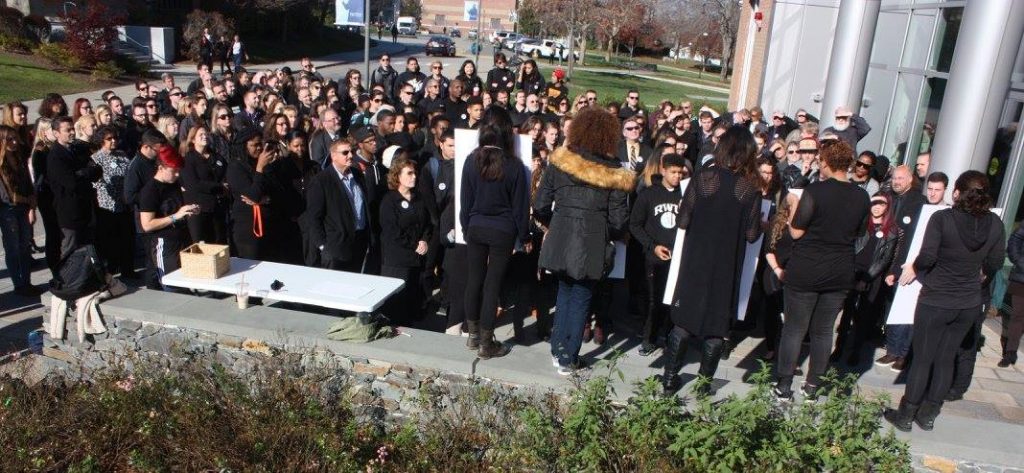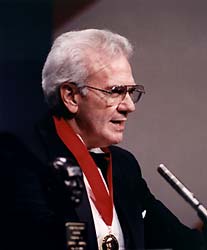I write today to welcome you back to campus for the spring semester of 2017, and I wish you every success in your work and studies. But, as you return, I also want to acknowledge the political polarization, tension and anxiety that exists in our country today, and ask you to recognize that universities have not just the opportunity but the responsibility to demonstrate to the broader society how differing points of view can be raised and discussed in a civil and respectful manner. Roger Williams University has a particular responsibility in this regard because of our relationship to Roger Williams, the man, for reasons that I will review later in this letter.
Our differences, of course are not just political. The people who make up the RWU community reflect the diversity of the broader American public — not proportionately, to be sure, but diversity is present on our campus in many ways: racial, ethnic, religious, national origin, economic, geographic, gender identification, sexual orientation, and so forth. And these are not mutually exclusive categories, since many individuals identify with more than one category. Many people within these categories — or entire categories — have also historically felt (or still feel) the burden of oppression or the sting of rejection by members of other groups, although the magnitude of that bias varies widely: laws against interracial marriage or homosexual practice existed in many jurisdictions until recently, whereas bias based on economic differences results more from unequal levels of access and buying power than because of statutory or case law.
Consider just a few of the issues now before us. For more than a year, America has seen widespread protests against the deaths of black men at the hands of police. Is there nothing we can do to address this situation? The U.S. Supreme Court has overturned state laws banning same-sex marriage — but will that position be reversed once a new justice is appointed? We have witnessed controversy over how best to deal with undocumented immigrants: should they be eligible for in-state tuition at public universities? Should they be granted driver’s licenses? Should they be offered a path to obtaining permanent status, or even citizenship — or should they be deported? And, in answering those questions, does it matter whether they arrived here as adults, or as young children?
These issues, and many others, may soon receive reconsideration, inasmuch as one party now controls the House, the Senate and the White House. What will reconsideration mean for America? What will it mean for the RWU community?
The quick answer is that we don’t know. But our choice, as a community, is between avoiding raising any topic that may be controversial, out of concern of offending someone, or — as I believe — exploring difficult subjects deliberately and publicly, in order to allow members of our community to hear both sides of an issue and to develop well-considered positions of their own. The caveat is that we must find ways to discuss and dispute our differences civilly and rationally.
I want to be clear that it is not my intention to work toward developing an RWU position on these topics. Rather, I am advocating for a process — a call for an intentional dialogue wherein the sharp differences that divide us as a nation can be explored calmly and politely on our campus, rather than allowing ourselves to fall prey to forums designed for shouting the other side down.
The basis of my advocacy starts with our namesake, Roger Williams. Roger Williams was a man well ahead of his time. He not only opposed the idea of a state religion, but also welcomed those of any faith (or no faith) to settle in our state — an idea that was incorporated into the United States Constitution a century and a half later, yet an idea still not accepted in many countries to this day. Roger Williams opposed slavery, and he purchased, rather than appropriated, land from Native Americans. He learned the language of the local Native American tribes, and did not treat them as savages needing to be converted to Christianity, but as people with a culture worth admiring. He especially loved a good debate. I looked to Roger Williams to provide me moral guidance as I worked through my own position on various of today’s thorny issues.
One of RWU’s six goals from our Vision Project of 2015 is to create a campus that broadly reflects the diversity of our geographic region in all respects — and implicit in this goal is not just to tolerate, but to enhance and embrace this diversity, to work to ensure that members of every group enjoy the same rights and privileges as any other group, to celebrate our collective success as a community, and not to accept, let alone promote, uneven levels of power or prestige in one group relative to another. That requires not mere passive acquiescence, but proactive commitment to fairness and equity as desired outcomes.
So here are some steps I have taken recently:
Over the last few weeks, I, along with many other university presidents, have signed three letters that are being transmitted to the new president and members of Congress.
One letter supports the continuation of DACA — Deferred Action for Childhood Arrivals — a program started by the Obama administration in 2012 that, in return for registration, and subject to a number of provisions, provides minors who were brought to this country certain rights and privileges. We have six such students on our campus now, and there are more than 750,000 registrants nationally (not all of whom are in college). In signing the letter, I wanted our DACA students to know that, absent a legal requirement to do so, Roger Williams University will not provide information about them to federal authorities.
A second letter calls for a reaffirmation of “the core values of our democratic nation: human decency, equal rights, freedom of expression and freedom from discrimination.” By today’s standards, these values would seem noncontroversial — and yet there is already talk in Washington of an initiative to roll back certain recent and hard won victories of rights for members of the LGBTQ community. I thought it was very important that I reaffirm our institutional value of providing equal rights to members of all groups.
Finally, a third letter addresses the need to honor our international commitments to reducing carbon dioxide levels in the atmosphere, and “to invest in the low carbon economy” in order to minimize rising sea levels that result from climate change. Our stated campus goal of promoting “sustainability” seemed to require me to sign this letter.
But it’s not enough merely to call attention in Washington to our principles. We also have the obligation to live out those principles on our own campus. For example, as we become more diverse, we confront the reality that not all of us have had the experience of living and working with individuals from historically underrepresented groups. Therefore, to facilitate more comfortable classroom conversations, we are providing cultural competency workshops for our faculty and staff, beginning in late January, and continuing through the spring semester, to allow all the opportunity to attend. These workshops are in direct response to the student-led Justice in the Classroom movement on our campus, and we believe and hope that these and similar actions will create a better learning environment for all students.
There will be other forums as well, and I urge you to attend as many of them as your schedule permits. Our year-long “Quest for Refuge” series will continue through the spring semester. Both the School of Law and the Division of Student Life are sponsoring workshops that will be announced in due course. I plan to have more “Fireside Chats” on themes that emerge from conversations with students, faculty and staff. We will continue to engage with you on themes and topics that are current and relevant to our campus, our state, and our nation.
I look forward to hearing your views as we incorporate these matters into your educational experiences here at Roger.


